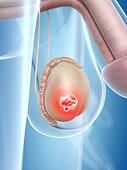
Does Having One Testicle Reduce Fertility?
By Richard Banks 09/28/2012 11:39 AM
In all honesty, this question is one I’ve thought about time and time again. If men have two testicles and both testicles produce sperm how would the removal of one testicle, or being born with only one testicle, impact fertility. The answer, to my shock, was that a man with one testicle produces just as much sperm as a man with two testicles.
Semen and Sperm Production
If a man is born with two testicles, he will produce sperm and semen in both. Tubes connect the testes to the penis where semen and sperm are moved out of the body during ejaculation. If one testicle is not present at birth or if one is removed at some point in life, the other testicle takes over semen and sperm production.
There could be reduced semen production as a result of having only one testicle, but fertility is not affected in most cases. Let’s take a look at this in numerical terms. Sperm production in excess of 20 million per sample is considered normal. If a man produces 100 million sperm with two testicles and that number is cut in half due to the loss of one testicle, sperm production is still within normal levels. However, the remaining testicle will pick up sperm production so the total number of sperm may not be halved in a real life situation, so more than 50 million sperm could be produced in reality.
What About Those Rare Cases?
Sure, there are rare cases where testicle removal or being born with only one testicle affects fertility, but it takes only one sperm to fertilize the egg, so any production is good enough for conception with assisted technology, in most cases.
If you feel you could be producing less sperm than needed to conceive and you’ve been having problems with fertility, a spermanalysis can put your mind at ease. Sometimes, the cause of infertility has nothing to do with sperm production at all, but it’s nice to see the normal numbers on paper and may be enough to reduce stress and increase your chances of natural conception.
Tags:
All Richard Banks's blog posts


No comments :
Post a Comment